The Best Speculative Poetry of the Year is Explosive
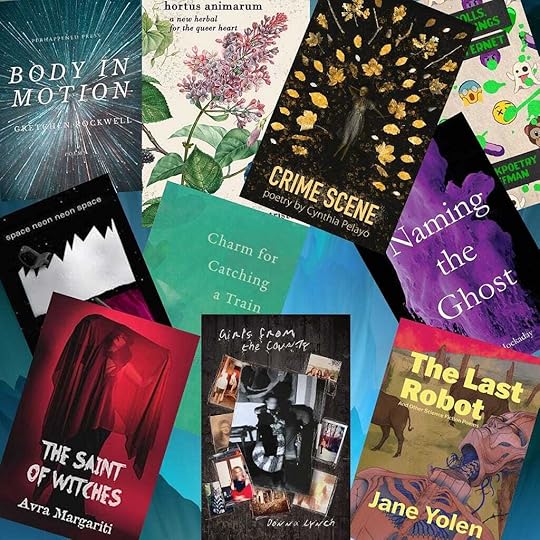
This is my fifth (!) year reviewing selections from the SFPA (Science Fiction and Fantasy Poetry Association) Elgin Award for best speculative poetry book. A full list of nominated books is available on the SFPA website. This year’s award chair is Morgan L. Ventura, who I would like to thank for diligently tracking nominations. Here are my previous reviews:
The Best Speculative Poetry of the Year is EpicSpeculative Poets Renegotiate Femininity & the StrangeThe Best Speculative Poetry Engages in Experimental FormsThe Best Speculative Poetry is Creepy AFAbout the Awards: The Elgin Awards, named for SFPA founder Suzette Haden Elgin, are presented annually by SFPA for books published in the preceding two years in two categories, Chapbook and Book. Chapbooks must contain 10–39 pages of poetry and books must contain 40 or more pages of poetry. E-books are eligible, as well as print. Books that won first–third place in the previous year’s Elgin Awards are ineligible. Single-author and collaborative books are eligible; anthologies are not. Books containing fiction as well as poetry are not eligible. Books must be in English, but translations are eligible. In the case of translations that also contain the poems in the original language, those pages will not count toward the total page count. Nominated books must be made available to the Chair upon request to remain eligible.
Thoughts on This Year’s BooksFirstly, I would like to point out that this year’s Elgin nominees include far fewer chapbooks than normal, which is a shame because chapbooks are the bread and butter of poetry. It makes sense that we are seeing more full-length collections, though, as award-giving bodies rarely recognize chapbooks. This is one of the reasons I enjoy the Elgin Award. Chapbooks are an important stepping stone for poets.
I was delighted to see far more LGBTQIA+, trans, and queer voices on the list this year than in previous iterations. It gives me hope that the powerful association between the other and queerness continues to be explored and is reaching further recognition.
I was also particularly delighted to see that more publishers are doing the work of providing context to experimental works that benefit from the author’s perspective. I never tire of reading author notes, nor do I feel they take away from the work itself. I also appreciated that more publishers are opting to highlight the work of cover artists and typographers in their end matter.
In compiling my reviews, I was disappointed that many works were not available for purchase easily online, didn’t have a website, or were not searchable by ISBN (often lacking one entirely). While speculative poetry has come a long way, it’s important to note that even self-published works should have a home online for readers and reviewers to find the book.
On this year’s list are several poetic sequences (often referred to as novellas in verse), a form that combines narrative and lyricism. I’m excited to see more poets taking a risk with longer forms and curious to see how this new trend evolves. Poets love to quibble over the definition of these terms. In my definition, a poetic sequence is a series of poems on the same topic, while an epic poem is one long uninterrupted poem. Poetic sequences are not necessarily narrative, whereas epic poems are inherently about one larger story arc. A novella-in-verse can be either.
These books are explosively excellent. Every one of them is worth a read, and not just for their storytelling but for their use of structure, awareness of the speculative poetry market, and outstanding use of emotion.
How I Create This ListHow do I pick books for this list? This is merely a recommended reading list, not a “best of,” because the list I am pulling from is the nominated works from the SFPA membership. My primary concern is highlighting works I feel deserve more reads. I tend to skew heavily feminist, focusing on writers of color, LGBTQIA+ voices, and disabled poets. The list is subjective to my tastes. I spend less time on men (cis-gendered, heterosexual) because those voices have enough support. I always make a Goodreads list of the total nominated works, which you can access here.
Lastly, in the past, there has been some (IMHO short-sighted) discussion as to whether such lists are “bad” because they skew members’ voting towards one work or the other. I find this difficult to believe because I review a huge number of books selected for the Elgin. I also believe the SFPA membership has enough independent thought to be able to do their own voting. The list is not to highlight those works I think you should vote for but to highlight the amazing works nominated each year and lift up the endeavor as a whole. Vote as you see fit.
One more note: I am writing from my perspective. If I make an error, please comment or message me. I never want to misrepresent a work simply because I misread it. Also, this list contains works I wrote or edited. I feel poets should be vocal about promoting their work, but if this bothers you, you can scroll on past.
Chapbooks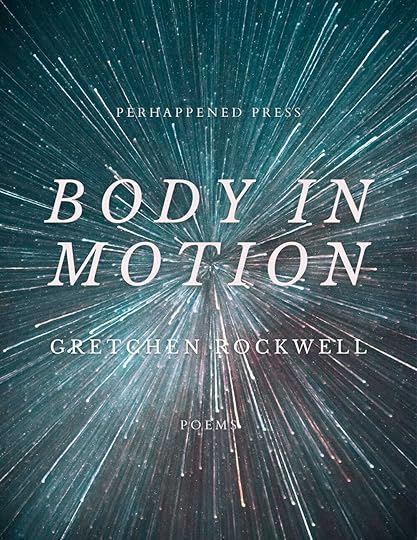 body in motion, Perhappened Press, 2021body in motion (Perhappened Press, 2021)by
Gretchen Rockwell
body in motion, Perhappened Press, 2021body in motion (Perhappened Press, 2021)by
Gretchen Rockwell
Rockwell is one of the premier speculative poets focusing on issues of the body and body in motion (Perhappened Press, 2021)is no small addition to Xer’s catalog. Nominated along with Rockwell’s 2021 Lexicon of Future Selves (Vegetarian Alcoholic Poetry, reviewed by me in 2022), this chapbook explores space as a metaphor for the body. From Egyptian goddesses to Tantalus to Arthurian myths, Rockwell softly pivots on an axis of feminism and lyricism. Xier characteristic exploration of structure exists in poems like “The Aerialists” and “Launch Sequence,” utilizing white space to imply outer space. Every poem is an emotional star in this tiny constellation. Stay tuned for Rockwell’s new poetry collection, listen, forthcoming from Interstellar Flight Press.
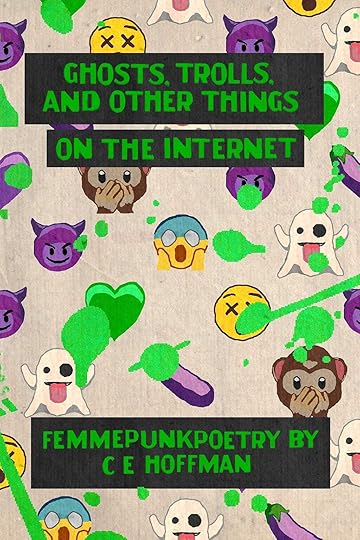 Ghost, Trolls, and Other Things on the Internet, Bottlecap Press, 2022Ghosts, Trolls, and Other Things on the Internet (Bottlecap Press, 2022)by C. E. Hoffman
Ghost, Trolls, and Other Things on the Internet, Bottlecap Press, 2022Ghosts, Trolls, and Other Things on the Internet (Bottlecap Press, 2022)by C. E. HoffmanI was drawn in by the cover for Hoffman’s slim chap, printed beautifully by Bottlecap Press in the old-school zine style. “Femmepunk” is a genre of the speculative I’ve longed to name, and I’m delighted to see this term used here. The genre, to me, is an exploration of the simmering rage of feminism wrapped up in a digestible packet of SFF tropes about technology. Hoffman explores the inequality of algorithms, body dysmorphia in selfies, and how to stand up to trolls. Pop culture abounds from Jonathan Larson to Buffy to Taylor Swift in a world “Before punk was an industry; / and love became commodity; / before cleverness was click bait”. Short, sour-sweet, and witty.
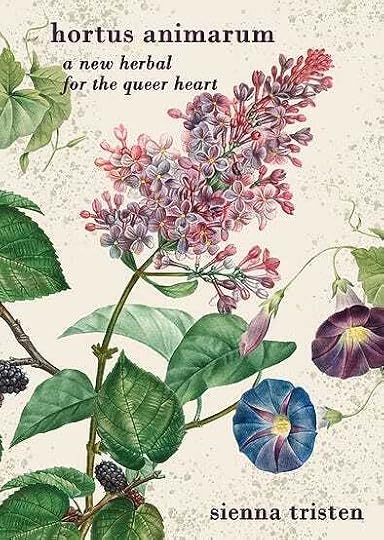 hortus animarum, Frog Hollow Press, 2022hortus animarum (Frog Hollow Press, 2022)
hortus animarum, Frog Hollow Press, 2022hortus animarum (Frog Hollow Press, 2022)by Sienna Tristen
9/10 gardeners agree you are aggressive frustrating invasive
too much because no one asks anything but how do we
stop get rid of controlcontrolcontrol
If you know me at all, you’re probably aware I’m a sucker for naturalism and old field guides, so Tristen’s queer “herbal” indeed healed my stressed-out, shitty little gay heart. Arranged in a “garden party” of different green things à la Louise Glück’s Wild Iris, this chapbook explores love/rs through the metaphor of plants. Each poem is a prose poem except the opening poem, which works well to guide the reader through each mini-narrative. I particularly enjoyed the “index of related terms” and the recognition of the cover art’s sources. Every book should include this in its contents.
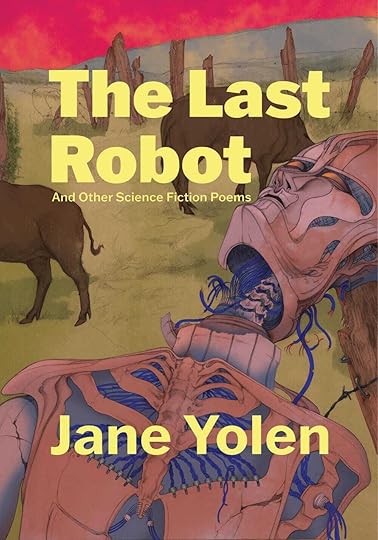 The Last Robot and Other Science Fiction Poems, Shoreline of Infinity, 2021The Last Robot and Other Science Fiction Poems (Shoreline of Infinity, 2021)by Jane Yolen
The Last Robot and Other Science Fiction Poems, Shoreline of Infinity, 2021The Last Robot and Other Science Fiction Poems (Shoreline of Infinity, 2021)by Jane YolenAs Jo Walton so astutely notes in the introduction, “If Science Fiction had a poet laureate it would be Jane Yolen.” Every book of speculative poems from Jane Yolen is a treat, and from such a prolific children’s book author, it is a comfort to read a Yolen book. If you’re like me, you may not be aware that the magazine Shoreline of Infinity releases the occasional book, which is a shame because this title is a delight. I particularly loved “Can SciFi Save Us?” which answers, “…a single story told enough times, / warmed in the mouths of a thousand tellers, / resurrected from a cross of Martian timber, / plowed into the dirt of a million stars / might make a difference.”
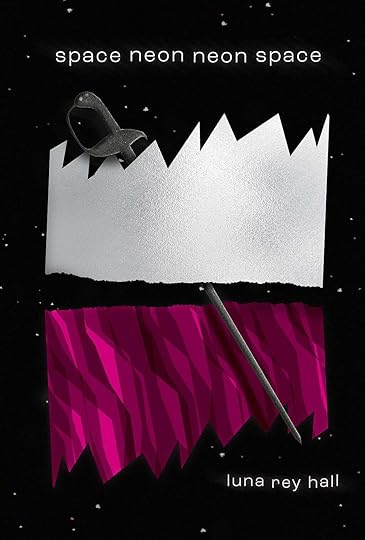 space neon neon space, Variant Lit, 2022space neon space (Variant Lit, 2022)by Luna Rey Hall
space neon neon space, Variant Lit, 2022space neon space (Variant Lit, 2022)by Luna Rey HallLuna Rey Hall has an adroit grasp on experimental structures that is fascinating to behold. But beneath that lies emotional and heart-wrenching work that isn’t afraid to go deep. “coming out to my mother” explores the trauma of coming out when the parent is diagnosed with cancer, “tiktok comment section” dives into the terror of being non-binary online, and “dypshoria” is an unflinching representation of fatness as it relates to the queer body. Science grounds these poems from bioluminescence to cells, and I’m left assured that all queerness is inherently speculative. I, for one, can’t wait to see what Hall writes next.
 Terror of the Zombie Zonnets, House of the Fighting Chupacabras, 2022Terror of the Zombie Zonnets: Season Three of Planet of the Zombie Zonnets (House of the Fighting Chupacabras, 2022)by Juan Manuel Pérez
Terror of the Zombie Zonnets, House of the Fighting Chupacabras, 2022Terror of the Zombie Zonnets: Season Three of Planet of the Zombie Zonnets (House of the Fighting Chupacabras, 2022)by Juan Manuel PérezI’ve had the pleasure of listening to Juan Manuel Pérez read his poetry at many a Texas-based science fiction convention, and each time it is a treat. Pérez is indeed the “Zombie Texas Poet of the Year.” A strictly form-based poet, Pérez twists the sonnet into new, more accessible poems. Pérez’s work is both hilarious and serious, charming and essential because it explores the intersection between Mexican-American indigenous identity and speculative tropes. These poems may seem light on the surface, but if you can’t see beyond the humor, “move in closer so you can hear better.” Stay tuned for Juan Manuel Pérez’s new poetry collection, Bury My Heart Under the Martian Sky, forthcoming from Interstellar Flight Press.
Full-length Books […], Astrophil Press, 2021[…] (Astrophil Press, 2021)by Ava Hofman
[…], Astrophil Press, 2021[…] (Astrophil Press, 2021)by Ava HofmanAs Never Angeline North says, “ava hofman has mercifully rescued experimental poetry from academia and dumped it squarely into the pit of the queer occult.” It’s rare to find true explorations of the concrete poem form in speculative poetry, but Hofman obliges in this collection of visual poems. On the surface, Hofman’s work is not exactly accessible to the average reader or perhaps even a poetry reader familiar with experimental work. I found myself flipping to the end of the book in search of the author’s note or “Changelogue,” which did not disappoint in adding the necessary context to understand and appreciate this work and perhaps should have come first in the book. This isn’t to say that this work can’t be enjoyed without the context, but it is so very important that it almost feels like a part of the book itself. This book of poetry was written during transition and as a way for the author to find herself through the exploration of phantasmagoric medieval texts.
As Hofman says, “queer people have existed forever, but any evidence of them in the archive is precious, because so often our histories were destroyed, or simply could not be preserved in cultures defined by homophobia and transphobia.” […] is an attempt to explore “the archive” of medieval texts through a queer voice, inspired by Felix Grendon’s 1909 translation of Old English charms. Fans of the illuminated manuscript will recognize Hofman’s choice of arrangement. There is so much to say here about the power of fragment, of finding oneself in the past, and how found text works in poetry. But I’ll let this powerful work speak for itself.
[…] may i speak […] // my holy pages, with […] neither nothing […]
[…] nothing […] // […] may i […] may […] speak it […] speak, […]
 Bless the Daughter Raised by a Voice in Her Head, Penguin Random House, 2022Bless the Daughter Raised by a Voice in Her Head (Penguin Random House, 2022)by Warsan Shire
Bless the Daughter Raised by a Voice in Her Head, Penguin Random House, 2022Bless the Daughter Raised by a Voice in Her Head (Penguin Random House, 2022)by Warsan ShireWarsan Shire is one of the most important poets of our current time. A Somali British writer born in Nairobi and raised in London, Shire has won some of the most prestigious awards in poetry today. This book nominated for the Elgin is her first full-length poetry collection, exploring girlhood, family dynamics, life as a refugee, and imagination. Speculative elements like body horror, transhumanism, ghosts, cannibalism, Utopia, and 90s pop culture weave with a narrative of growing up other. New poets could benefit from studying Shire’s poetry as a lesson in making every word count and expressing vulnerability to connect emotionally with the reader. Readers will appreciate the inclusion of the glossary, which adds context to this powerful work.
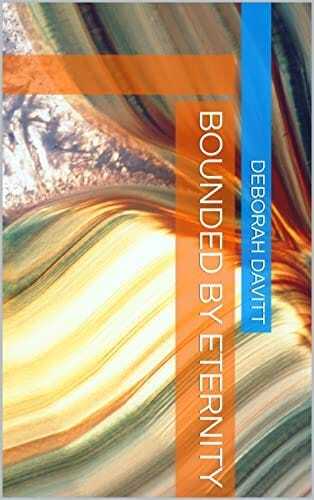 Bounded by Eternity, Edda Earth, 2022Bounded by Eternity (Edda Earth, 2022)by Deborah L. Davitt
Bounded by Eternity, Edda Earth, 2022Bounded by Eternity (Edda Earth, 2022)by Deborah L. DavittReaders interested in narrative forms will enjoy this linked poem sequence inspired by the story of Oberon, the faerie king from Shakespeare’s A Midsummer Night’s Dream. Here, Davitt explores Oberon’s origin as a character in the Nibelungenlied, a German epic poem in the vein of Lord of the Rings. Davitt is, at heart, a storyteller, and readers who love high fantasy will likely recognize much of the layering happening in this collection. The average reader may struggle to put together the context here, as the story is richly referential and relies on the deep history of the fantasy poetry epic. The novella in verse is a tricky form, but who doesn’t love a story about a fay king? For more of a deep dive, check out Interstellar Flight Press’ interview with Davitt by T.D. Walker.
 Crime Scene, Raw Dog Screaming Press, 2022Crime Scene (Raw Dog Screaming Press, 2022)by Cynthia Pelayo
Crime Scene, Raw Dog Screaming Press, 2022Crime Scene (Raw Dog Screaming Press, 2022)by Cynthia PelayoI reviewed Pelayo’s Into the Forest and All the Way Through in 2021, and I’m excited to read another true crime poetry collection that also won the HWA Bram Stoker Award. Pelayo plays with the novella in verse/epic, as she terms it. The poems are meant to be read sequentially as a series of reports. Pelayo uses a variety of poetic forms, from the prose poem to free verse to experimental poems made entirely of one-word sentences. The poems follow Agent K as she attempts to solve a murder. It’s refreshing to read this familiar story told from the perspective of a female detective. Readers of true crime will enjoy the universal truths of crime that Pelayo explores on the page in poetic form.
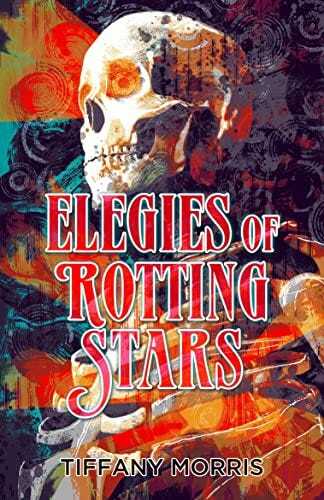 Elegies of Rotting Stars, Nictitating Books, 2022Elegies of Rotting Stars (Nictitating Books, 2022)by Tiffany Morris
Elegies of Rotting Stars, Nictitating Books, 2022Elegies of Rotting Stars (Nictitating Books, 2022)by Tiffany MorrisOne of my favorite things about Tiffany Morris’ poetry is how she takes horror tropes and makes them personal, like in “I Am My Own Haunted House,” with its stunning images and evocative metaphors. Here again, Morris weaves her Mi’kmaw background into many of the poems, but they never feel inaccessible to the unfamiliar reader. This collection is worth reading, if only for the sheer vibes of it all.
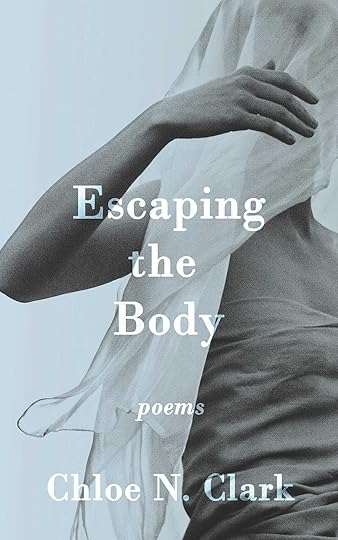 Escaping the Body, Interstellar Flight Press, 2022Escaping the Body (Interstellar Flight Press, 2022)by Chloe N. Clark
Escaping the Body, Interstellar Flight Press, 2022Escaping the Body (Interstellar Flight Press, 2022)by Chloe N. ClarkChloe N. Clark is perhaps one of the most published speculative poets of our time, with her poems appearing in hundreds of journals. Escaping the Body explores space, forests, monsters, myths, spells, magic tricks, forests, and the body, to name a few speculative elements in the collection. Clark’s poetry is accessible and narrative in places, with a satisfying journey through the collection that builds the reader's emotion in a slow burn of subtlety. Reading Clark’s work feels like falling into a conversation with an old friend, one who really loves all the same spooky shit you do. Read Leslie Archibald’s interview with Chloe N. Clark at Interstellar Flight Magazine.
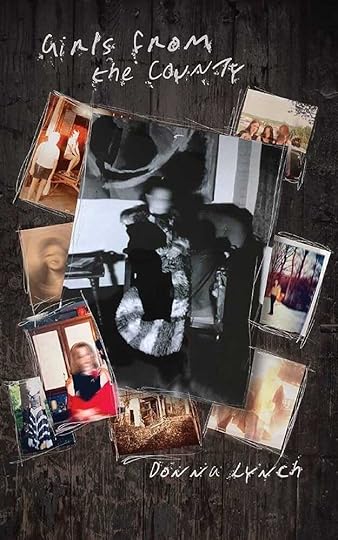 Girls from the Country, Raw Dog Screaming Press, 2022Girls from the County (Raw Dog Screaming Press, 2022)by Donna Lynch
Girls from the Country, Raw Dog Screaming Press, 2022Girls from the County (Raw Dog Screaming Press, 2022)by Donna LynchLynch’s unflinching portrayal of country life runs like a freight train into feminist horror and doesn’t look back. At times both nostalgic and claustrophobic, the poems in Girls from the Country explore the intersection of horror, growing up as a woman, and rural life. “These places want you dead,” Lynch contends, and as someone who grew up in small-town Texas and spent my summers rambling the houses and lands of my country family, I love the brutal honesty with which these poems examine the bitter underbelly of the past. I, too, “wanted to be one of those girls / who died tragically” — and I, too, did ugly things driven by a narrow-minded upbringing that I’m only now learning to untie from my being. This book is a worthwhile read for any fan of horror poetry.
 The Gravity of Existence, Interstellar Flight Press, 2022The Gravity of Existence (Interstellar Flight Press, 2022)by Christina Sng
The Gravity of Existence, Interstellar Flight Press, 2022The Gravity of Existence (Interstellar Flight Press, 2022)by Christina SngChristina Sng is a wizard of the scifaiku or speculative haiku form. Here, Sng has collected many small poems, combining them to great effect. These poems, despite being small, have true depth. The heart and emotion behind them is what stands Sng apart from other speculative haiku poets. It’s not just humor but a deep well of meaning. This one is for you if you love small poems, haiku, and speculative poetry.
Read Archita Mittra’s interview with Christina Sng at Interstellar Flight Magazine.
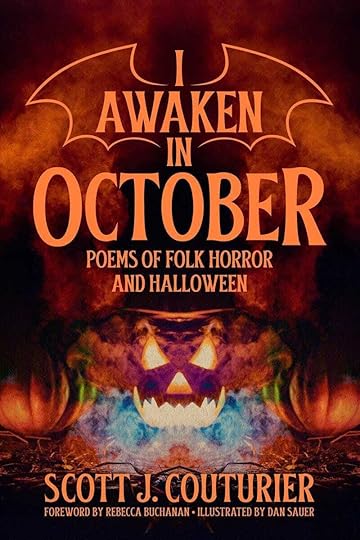 I Awaken in October, Jackanapes Press, 2022I Awaken in October: Poems of Folk Horror and Halloween (Jackanapes Press, 2022)by Scott J. Couturier
I Awaken in October, Jackanapes Press, 2022I Awaken in October: Poems of Folk Horror and Halloween (Jackanapes Press, 2022)by Scott J. CouturierAs I sit in my sweltering house under a struggling Texas AC, I long with every bone in my body for Autumn. I also awaken in October, and so Scott J. Couturier’s poems felt like reading a love letter to my favorite season. These poems are lyrical, susurrus in sound, and full of delightful images that invoke the season of fall. If you want to fall in love with fall again, this is the perfect book for you. All of the Jackanapes Press Halloween-themed books are a worthwhile read. It’s also worth buying in print: The interiors are exquisitely designed, with images that compliment the poems well and don’t overpower the reader. I also appreciated the end matter, which includes bios for the foreword and artist Dan Sauer, who has created many phenomenal speculative poetry covers.
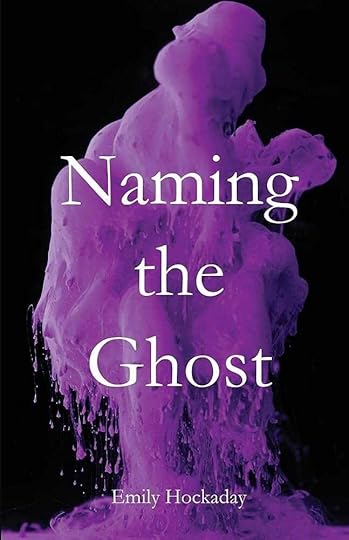 Naming the Ghost, Cornerstone Press, 2022Naming the Ghost (Cornerstone Press, 2022)by Emily Hockaday
Naming the Ghost, Cornerstone Press, 2022Naming the Ghost (Cornerstone Press, 2022)by Emily HockadayEmily Hockaday’s work straddles the line between the “literary” and the speculative, which is to say, we hope she’ll jump ship and let us claim her as our own. This collection focuses on the locus of The Ghost — a well-loved trope in horror poetry but managed deftly with contemporary poetry structures by Hockaday, who extends the metaphor into the domestic. I’m of the belief that the best speculative poetry collections revolve in a kind of triad of topics — in this case: Ghost, Marriage, Motherhood. At once feminist and satisfyingly spooky, Hockaday shows that a well-themed collection is worth the effort.
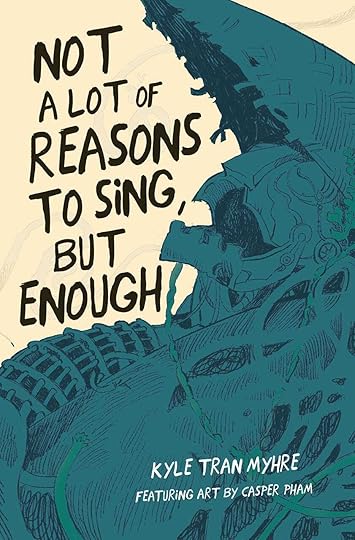 Not a Lot of Reasons to Sing but Enough, Button Poetry, 2022Not a Lot of Reasons to Sing but Enough (Button Poetry, 2022)by Kyle Tran Myhre
Not a Lot of Reasons to Sing but Enough, Button Poetry, 2022Not a Lot of Reasons to Sing but Enough (Button Poetry, 2022)by Kyle Tran MyhreDelightfully Meta and sumptuously illustrated, Kyle Tran Myhre’s ephemera related to the imaginary robot Gyre is an example of a speculative framing that invites the reader into a world and won’t let them out again. I’m a sucker for graphic novels, and this is part graphic novel, part poetry collection, part Princess-Bride-esque adventure. The “memo” note at the beginning of the book does a fantastic job of setting up what the reader should expect from the poems. Unlike what is often the case in complex premises, the poems here do not suffer under too much explanation or too little context. If I could hold up an example of the contemporary speculative novella-in-verse, it would be this book, on par with such emblems as Sofia Samatar’s Monster Portraits. Button Poetry does not disappoint.
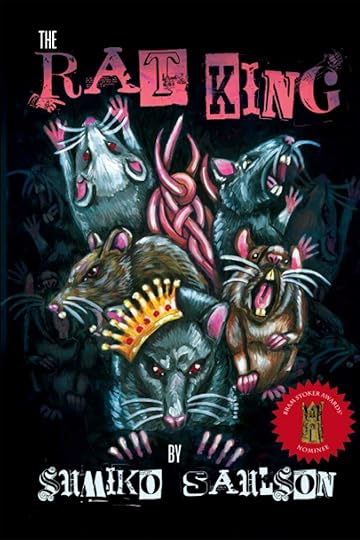 The Rat King, Dooky Zines, 2022The Rat King (Dooky Zines, 2022)by Sumiko Saulson
The Rat King, Dooky Zines, 2022The Rat King (Dooky Zines, 2022)by Sumiko SaulsonRetellings of The Tooth Fairy delight, but I am drawn most to Saulson’s gritty, truth-filled poems about intersectionality, like “Generations of the Imaginarium,” which explores mental illness, ancestry, and the power of imagination. I am fascinated by how Saulson places such conversations, often bombastically and without apologetics, between the fairy tales and horror of speculative poetry. Saulson places pop culture next to romance and the speculative, encouraging the reader to make connections between them. These poems travel far and wide, at times internal and emotional, at others brash and magical. This collection’s punk rock roots are showing, and I’m listening.
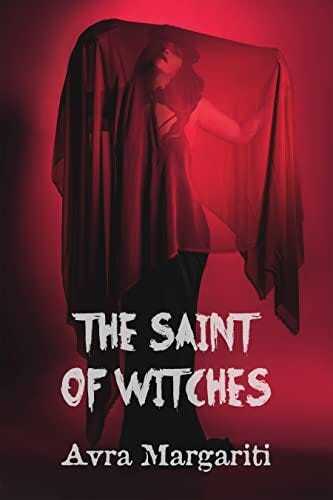 The Saint of Witches, Weasel Press, 2022The Saint of Witches (Weasel Press, 2022)by Avra Margariti
The Saint of Witches, Weasel Press, 2022The Saint of Witches (Weasel Press, 2022)by Avra MargaritiAvra Margariti is one of my favorite up-and-coming speculative poets, and this debut shows Margariti’s command of narrative and the poetic turn. Poems like “Moonlit, the Secret,” which brings the reader to surprise in only three stanzas, show how speculative poetry is the space to watch in terms of new SFF. Feminist, bloody, insightful, and queer af, this collection is full of delights.
Honorable Mentions to Add to Your TBR:As always, I can’t list ALL of the books that I loved in this short space, so I like to include a list of books you should FOR SURE add to your reading list but that I didn’t get time to review.
Flare, Corona by Jeannine Hall Gailey (BOA Editions, 2022)Halloween Hearts by Adele Gardner (Jackanapes Press, 2022)Mobius Lyrics by Maxwell I. Gold & Angela Yuriko Smith (Independent Legions, 2022)No Farther Than the End of the Street by Benjamin Niespodziany (Okay Donkey, 2022)Not a Princess, But (Yes) There Was a Pea & Other Tales to Foment Revolution by Rebecca Buchanan (Jackanapes Press, 2022)We’ve Been Here Before by Anne Carly Abad (Aqueduct Press, 2022)A full list of the nominated works for the Elgin Award is available on the SFPA website.
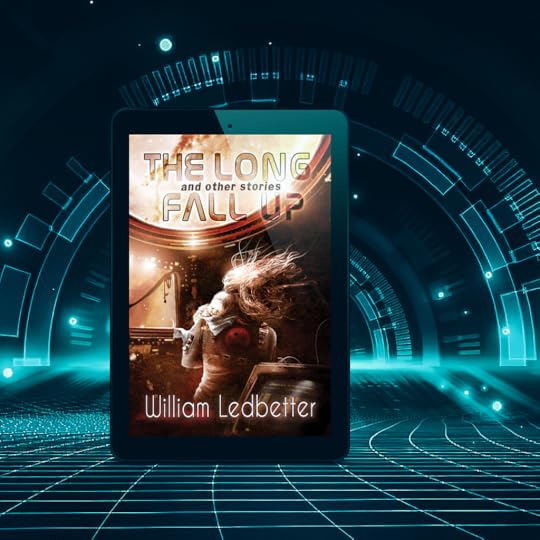 Forthcoming from Interstellar Flight Press: The Long Fall Up and Other Stories, by Nebula Award winning author William Ledbetter. Now available for pre-order!
Forthcoming from Interstellar Flight Press: The Long Fall Up and Other Stories, by Nebula Award winning author William Ledbetter. Now available for pre-order!Interstellar Flight Magazine publishes essays on what’s new in the world of speculative genres. In the words of Ursula K. Le Guin, we need “writers who can see alternatives to how we live now, can see through our fear-stricken society and its obsessive technologies to other ways of being, and even imagine real grounds for hope.” Visit our Patreon to join our fan community on Discord. Follow us on Twitter, Facebook, or Instagram.
[image error]The Best Speculative Poetry of the Year is Explosive was originally published in Interstellar Flight Magazine on Medium, where people are continuing the conversation by highlighting and responding to this story.



